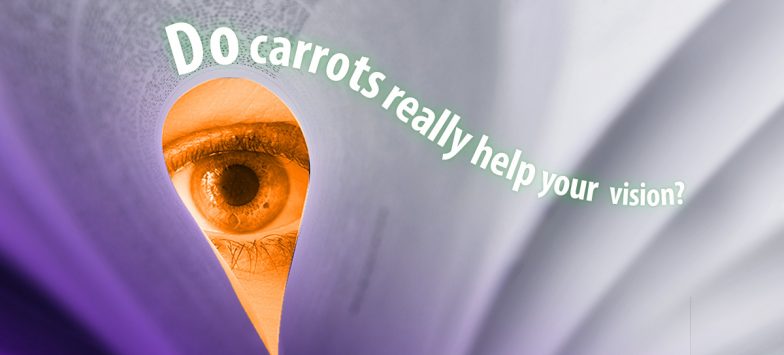
What’s Up, Doc? Bugs Bunny’s Carrots & Other Eye Myths
Would that rascally cartoon rabbit get supercharged eyesight from eating so many carrots? In real life we hear all sorts of ideas about what is good and bad for our eyes, but are they true? To separate fact from fiction, let’s look into 10 common myths about eyes:
1. Eating carrots will improve your vision.
While carrots contain vitamin A, which is essential for eye health, consuming excessive amounts of carrots or any other single food will not magically improve your vision beyond what is considered normal. Eating lots of carrots won’t keep you, or Bugs, from needing glasses or contacts. And just by the way, real bunnies prefer to eat the green carrot tops more than the orange root – who knew?
2. If you cross your eyes, they’ll stay that way.
Your eye muscles allow you to move your eyes in all directions. Looking left or right, up or down, won’t force them to remain in those positions, just as crossing the eyes won’t force them to stay that way. Crossed eyes may result from disease, uncorrected vision, or from muscle or nerve damage.
3. Only boys can be color blind.
Women can develop or inherit color blindness, too — but men are at much higher risk. An estimated 1 in 10 males have some form of color deficiency. Most color blind individuals are born with partial or complete lack of cones in the retina, making it more difficult to distinguish the colors red, green and blue.
4. Sitting very close to the TV can damage your eyes.
While sitting very close to the television may cause eye strain or give you a headache, it will not damage vision in children or adults. Habitually sitting close to the television may signal that the person needs glasses. However, children have heightened ability to focus on nearby objects, so they might find it more comfortable to sit close to the TV.
5. Staring at screens can permanently damage your eyes.
While prolonged screen time can cause digital eye strain or fatigue, it does not cause permanent damage or lead to conditions like glaucoma or cataracts. To avoid discomfort, be sure to rest your eyes every 20 minutes by looking up or across the room. Blink regularly and use artificial tears to promote moisture.
6. Losing vision is an inevitable part of aging.
Many vision problems that develop as people age can be treated. Presbyopia, which is near-vision loss, and cataracts can both be remedied to allow adults to see clearly again. It is important to have eye exams on a yearly basis to catch both reversible and permanent threats to vision, such as glaucoma or macular degeneration. Oftentimes, early treatment can slow or prevent vision loss.
7. Two brown-eyed parents can’t have a blue-eyed child.
Current research suggests that as many as 16 different genes could be responsible for eye color. That’s why two parents with the same eye color can have a child with an entirely different eye color. (For more on eye color, see: https://atlanticeye.com/2022/03/what-does-your-eye-color-say-about-you/)
8. Looking directly at the sun can improve your health and well-being.
Sun-gazing for even a short time without wearing the right eye protection can damage your retina permanently and even cause blindness. Ordinary sunglasses and homemade filters are not safe for looking at the sun. The only safe way to look directly at the sun is through special-purpose solar filters that meet the ISO 12312-2 standard.
9. Reading in dim light or poor lighting can damage your eyes.
While reading in low light conditions may strain your eyes temporarily or cause eye fatigue, it does not cause permanent damage or contribute to the development of eye conditions. It’s still recommended to read in well-lit areas to avoid unnecessary strain.
10. Eye exams are only necessary if I am having problems with my vision.
While you should always visit your optometrist or ophthalmologist if you’re having a vision problem, eye exams are something you should have regularly. Even if you have 20/20 vision, eye exams are preventative care and help to detect eye disease and other eye health problems as early as possible. If you’ve been putting off your eye exam, call Atlantic Eye today!
